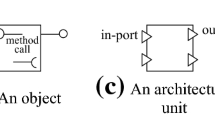Abstract
Current Object-oriented Design (OOD) methodologies tend to focus on objects as the unit of reuse, but it is increasingly recognised that frameworks, or groups of interacting objects, are a better unit of reuse. Thus, in next-generation Component-based Development (CBD) methodologies, we can expect components to be frameworks rather than objects. In this paper, we describe a preliminary attempt at a formal semantics for OOD frameworks in CBD in computational logic.
Access this chapter
Tax calculation will be finalised at checkout
Purchases are for personal use only
Preview
Unable to display preview. Download preview PDF.
Similar content being viewed by others
References
M. Abadi and L. Cardelli. A Theory of Objects. Springer-Verlag, 1996.
A. Bertoni, G. Mauri, and P. Miglioli. On the power of model theory in specifying abstract data types and in capturing their recursiveness. Fundamenta Informaticae VI(2):127–170, 1983.
R.H. Bourdeau and B.H.C. Cheng. A formal semantics for object model diagrams. IEEE Trans. Soft. Eng., 21(10):799–821, 1995.
D. Coleman, P. Arnold, S. Bodoff, C. Dollin, H. Gilchrist, F. Hayes, and P. Jeremaes. Object-Oriented Development: The Fusion Method. Prentice-Hall, 1994.
S. Cook and J. Daniels. Designing Object Systems. Prentice-Hall, 1994.
D.F. D’Souza and A.C. Wills. Extending Fusion: practical rigor and refinement. In R. Malan et al, editors, Object-Oriented Development at Work. Prentice-Hall 1996.
D.F. D’Souza and A.C. Wills. Catalysis: Components, Objects and Frameworks in UML. Addison-Wesley, October 1998. Draft available at http://www.trireme.com/catalysis/book.
J.L. Fiadeiro and T. Maibaum. Categorical semantics of parallel program design. Science of Computer Programming 28:111–138, 1997.
R.B. France, J.-M. Bruel, M. Larrondo-Petrie, E. Grant, and M. Saksena. Towards a rigorous object-oriented analysis and design method. Proc. 1st IEEE Int. Conf. on Formal Engineering Methods, pages 7–16, IEEE Computer Society, 1997.
A. Grau, J. Küster Filipe, M. Kowsari, S. Eckstein, R. Pinger and H.-D. Ehrich. The TROLL approach to conceptual modelling: syntax, semantics and tools. In T.W. Ling, S. Ram and M.L. Leebook, editors, Proc. 17th Int. Conference on Conceptual Modeling, LNCS 1507:277–290, Springer, 1998.
Y. Gurevich, Evolving Algebras 1993: Lipari Guide. In E. Börger, editor, Specification and Validation Methods, pages 9–36, Oxford University Press, 1995.
J.V. Guttag and J.J. Horning. Larch: Languages and Tools for Formal Specification. Springer-Verlag, 1993.
R. Helm, I.M. Holland, and D. Gangopadhay. Contracts-Specifying behavioural compositions in OO systems. Sigplan Notices 25(10) (Proc. ECOOP/OOPSLA 90).
C. Kreitz, K.-K. Lau, and M. Ornaghi. Formal reasoning about modules, reuse and their correctness. In D.M. Gabbay and H.J. Ohlbach, editors, Proc. Int. Conf. on Formal and Applied Practical Reasoning, LNAI 1085:384–399, Springer-Verlag 1996.
J. Küster Filipe. Using a modular distributed temporal logic for in-the-large object specification. In A. Brogi and P. Hill, editors, Proc. 1st Int. Workshop on Component-based Software Development in Computational Logic, pages 43–57, September 1998, Pisa, Italy.
K.-K. Lau, S. Liu, M. Ornaghi, and A. Wills. Interacting Frameworks in Catalysis. To appear in Proc. 2nd IEEE Int. Conf. on Formal Engineering Methods, 9–11 December 1998, Brisbane, Australia.
K.-K. Lau and M. Ornaghi. On specification frameworks and deductive synthesis of logic programs. In L. Fribourg and F. Turini, editors, Proc. LOPSTR 94 and META 94, Lecture Notes in Computer Science 883, pages 104–121, Springer-Verlag, 1994.
K.-K. Lau and M. Ornaghi. Towards an object-oriented methodology for deductive synthesis of logic programs. In M. Proietti, editor, Proc. LOPSTR 95, LNCS 1048:152–169, Springer-Verlag, 1996.
K.-K. Lau and M. Ornaghi. A formal approach to deductive synthesis of constraint logic programs. In J.W. Lloyd, editor, Proc. 1995 Int. Logic Programming Symp., pages 543–557, MIT Press, 1995.
K.-K. Lau and M. Ornaghi, Isoinitial Models for Logic Programs: A Preliminary Study, in J.L. Freire-Nistal, M. Falaschi, and M. Vilares-Ferro, editors, Proceedings of the 1998 Joint Conference on Declarative Programming, pages 443–455, A Coruña, Spain, July 1998.
K.-K. Lau and M. Ornaghi. On specification and correctness of OOD frameworks in computational logic. In A. Brogi and P. Hill, editors, Proc. 1st Int. Workshop on Component-based Software Development in Computational Logic, pages 59–75, September 1998, Pisa, Italy.
K.-K. Lau, M. Ornaghi, and S.-Å. Tärnlund. Steadfast logic programs. To appear in J. Logic Programming.
K.-K. Lau, M. Ornaghi, and A. Wills. Frameworks in Catalysis: Pictorial Notation and Formal Semantics. Proc. 1st IEEE Int. Conf. on Formal Engineering Methods, pages 213–220, IEEE Computer Society, 1997.
T. Maibaum. Conservative extensions, interpretations between theories and all that! In Proc. TAPSOFT 97, LNCS 1214:40–66, Springer Verlag, 1997.
R. Mauth. A better foundation: development frameworks let you build an application with reusable objects. BYTE 21(9):40IS 10–13, September 1996.
P. Miglioli, U. Moscato and M. Ornaghi. Abstract parametric classes and abstract data types defined by classical and constructive logical methods. J. Symb. Comp. 18:41–81, 1994.
J. Rumbaugh, M. Blaha, W. Premerlani, F. Eddy, and W. Sorenson. Object-Oriented Modeling and Design. Prentice-Hall, 1991.
J.M. Spivey. The Z Notation. Prentice Hall, 2nd edition, 1992.
Y.V. Srinvas and R. Jüllig Specware: Formal support for composing software. In Proc. MCP 95, LNCS 947:399–422, Springer Verlag, 1995.
M. Wirsing. Algebraic specification. In J. Van Leeuwen, editor, Handbook of Theoretical Computer Science, pages 675–788. Elsevier, 1990.
Author information
Authors and Affiliations
Editor information
Editors and Affiliations
Rights and permissions
Copyright information
© 1999 Springer-Verlag Berlin Heidelberg
About this paper
Cite this paper
Lau, KK., Ornaghi, M. (1999). OOD Frameworks in Component-Based Software - Development in Computational Logic. In: Flener, P. (eds) Logic-Based Program Synthesis and Transformation. LOPSTR 1998. Lecture Notes in Computer Science, vol 1559. Springer, Berlin, Heidelberg. https://doi.org/10.1007/3-540-48958-4_6
Download citation
DOI: https://doi.org/10.1007/3-540-48958-4_6
Published:
Publisher Name: Springer, Berlin, Heidelberg
Print ISBN: 978-3-540-65765-1
Online ISBN: 978-3-540-48958-0
eBook Packages: Springer Book Archive




